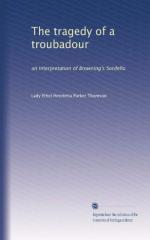|
This section contains 4,248 words (approx. 15 pages at 300 words per page) |

|
SOURCE: "Cantos VI-IX," in Purgatorio, translated by Allen Mandelbaum, University of California Press, 1982, pp. 48-80.
Dante is perhaps the most famous poet of the Middle Ages. An accomplished prose and verse stylist in both Latin and Italian, he was the first major author to compose literature in the Italian vernacular. His most famous work is the Commedia (c. 1320), later known as the Divina Commedia, which consists of three sections: Inferno, Purgatorio, and Paridiso, and details Dante's journey through the locales of medieval theology. In the following excerpt from the Purgatorio (c. 1307-20), Dante and Vergil experience a joyous encounter in the underworld with the Mantuan Sordello, who serves as their companion and guide, revealing to them the spirits of great rulers. Dante, who was significantly influenced by Sordello, links the troubadour with Roman history and extols him as a symbol of patriotic pride.
Canto Vi
"… But see—beyond...
|
This section contains 4,248 words (approx. 15 pages at 300 words per page) |

|


